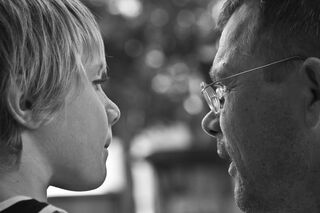Addiction
Like Father, Like Son
Emotionally abandoned by his father, a man vows not to follow in his footsteps.
Posted April 20, 2021 Reviewed by Ekua Hagan

Note: In this powerful personal story, my coauthor, James B., shares the multitude of personal, family, and social factors that put him at high risk for developing an addiction.
It was 7:00 p.m., and I had been waiting for more than two hours for my father to pick me up from basketball practice. Even the coach, who had stayed with me for the first hour, had given up and gone home.
My father had forgotten me before, and I could easily have walked to a friend’s home. But I was convinced he was coming any minute and would worry if he couldn’t find me. It would be years before I could admit that, because of his drug use, my father wasn’t thinking much about me at all.
I couldn’t help but compare him to my friend’s father who came to our games and brought us snacks. My father had never even seen me play. Every game, I looked into the bleachers to see if he was there, and he never was.
Now I was standing by the curb, throwing rocks in the dark and feeling more hurt, lonely, and angry by the minute. I would never be like my father. Never.
It was a heartfelt promise that I wasn’t able to keep. Only now, looking back on my boyhood self, do I understand how many risk factors I had for developing an addiction. Some were more universal, like being a risk-taking young person who craved excitement. But many were specific to my personal situation. Addiction ran through my family like a poisonous river. All four of my grandparents drank heavily, and my father was addicted to cocaine and marijuana. I also had experienced significant childhood trauma. As a 10-year-old, I had been sexually abused by a babysitter and then by a neighbor. These experiences had left me with a pervasive sense of shame and anxiety, feelings for which I had no words and was never able or willing to share with anyone.
Most importantly, as a teenager, my social circle was a group of athletes who, like me, were heavy drinkers. I could drink more than any of them, and alcohol made me feel great. My normal social anxieties were complicated by being sexually abused as a child, and when I was drinking, I felt less shy and awkward around girls.
Today, I would give anything to be able to go back in time and have a heart-to-heart talk with my teenage self. I would explain that, for him, the euphoria caused by alcohol was fool’s gold. All the good things in life that he craved—love, meaning, self-confidence, loyal friends, adventure—could be found elsewhere.
“The price of heavy drinking is going to be too high,” I would counsel him. “If you stay on this road, you’ll lose your better self and become the very thing you fear.”
But there was no such conversation, not with myself nor with any concerned adult. The binge drinking I began in high school became a lifestyle in college and opened the door for a second addiction. Long after my father found a program of recovery and was trying to become the father I always needed, I was losing my own life to an uncontrollable craving for alcohol and cocaine.
A few years ago, a family of heavy drinkers was celebrating a birthday in the restaurant where I worked. The parents and grandparents were joking with a young boy of five or six: “Do you want a Jack and Coke like your daddy?” The boy beamed, happy to be the center of attention. I imagined he wanted to grow up to be just like his father. And I couldn’t help but hope that he never would.


